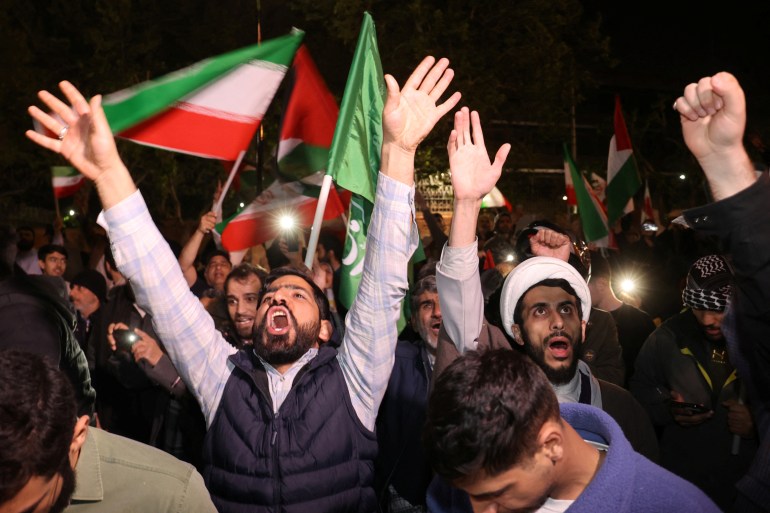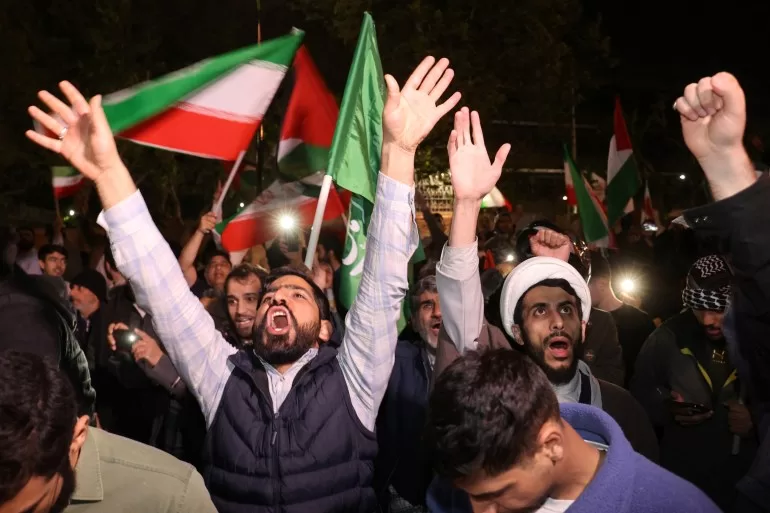Tehran had been threatening to attack Israel after an air raid on April 1, widely blamed on Israel, destroyed Iran’s consulate in Syria, killing 12 people, including two elite Iranian generals.
The Israeli forces said in a statement early on Sunday the “vast majority” of missiles launched from Iran were intercepted outside of Israel’s borders.
Tensions between Israel and Iran have soared since Israel’s six-month war in the Gaza Strip.
Here is how the world reacted to Iran’s retaliatory attacks on Israel:
United States
President Joe Biden condemned the Iranian attacks and pledged a coordinated G7 diplomatic response. He said the US had helped Israel take down “nearly all” of the attacking drones and missiles.
Biden said in a statement released by the White House that he reiterated the “ironclad” US support for Israel’s security in a call with Prime Minister Benjamin Netanyahu.
“I told him that Israel demonstrated a remarkable capacity to defend against and defeat even unprecedented attacks – sending a clear message to its foes that they cannot effectively threaten the security of Israel,” he said in the statement.
“Tomorrow [Sunday], I will convene my fellow G7 leaders to coordinate a united diplomatic response to Iran’s brazen attack,” he said.

United Kingdom
Prime Minister Rishi Sunak described Iran’s actions as “reckless”.
“Iran has once again demonstrated that it is intent on sowing chaos in its own backyard,” he said in a statement posted on X.
“The UK will continue to stand up for Israel’s security and that of all our regional partners, including Jordan and Iraq,” he added.
Read my statement on the Iranian regime’s reckless attack against Israel. pic.twitter.com/xeuR3cd3kG
— Rishi Sunak (@RishiSunak) April 13, 2024
European Union
“The EU strongly condemns the unacceptable Iranian attack against Israel,” EU’s top diplomat Josep Borrell said in a post on X.
“This is an unprecedented escalation and a grave threat to regional security.”
France
Foreign Minister Stephane Sejourne said Iran is taking a “new step in its destabilising actions and taking the risk of a military escalation”.
Germany
“We strongly condemn the ongoing attack, which could plunge an entire region into chaos. Iran and its proxies must stop this immediately,” Foreign Minister Annalena Baerbock said.
“Israel offers our full solidarity at this time.”
United Nations
“I strongly condemn the serious escalation represented by the large-scale attack launched on Israel by the Islamic Republic of Iran this evening,” Secretary-General Antonio Guterres wrote in a statement.
“I am deeply alarmed about the very real danger of a devastating region-wide escalation. I urge all parties to exercise maximum restraint to avoid any action that could lead to major military confrontations on multiple fronts in the Middle East,” he added.
Canada
Canadian Prime Minister Justin Trudeau told reporters in Ottawa that his country “unequivocally condemns Iran’s airborne attacks”, adding: “We stand with Israel.”
“After supporting Hamas’s brutal October 7 attack, the Iranian regime’s latest actions will further destabilise the region and make lasting peace more difficult,” he added.
China
China is deeply concerned about escalation after Iran’s attacks, a Ministry of Foreign Affairs spokesperson said in remarks published on its website.
“China calls on relevant parties to remain calm and exercise restraint to avoid further escalation of tensions,” the spokesperson said in response to a question about Iran’s strikes.
This round of tensions is a “spillover from the Gaza conflict”, and quelling that conflict is “a top priority”, the spokesperson added.
Spain
Prime Minister Pedro Sanchez called for restraint, saying on X: “We are following with the greatest concern the evolution of the situation in the Middle East. One must at all cost avoid a regional escalation.”
Saudi Arabia
The Saudi Ministry of Foreign Affairs issued a statement voicing its concern at the “military escalation” and calling on “all parties to exercise utmost restraint and spare the region and its peoples from the dangers of war”.
It went on to urge the UN Security Council “to assume its responsibility towards maintaining international peace and security”.
Qatar
The Gulf nation called on all concerned parties to stop the escalation and exercise utmost restraint.
In a statement, the Qatari Ministry of Foreign Affairs expressed “its deep concern regarding the developments in the region”.
It called on “all parties to de-escalate and exercise utmost restraint”.
It urged “the international community to take urgent action to defuse tension and reduce escalation in the region”.
Egypt
The Ministry of Foreign Affairs expressed its “deep concern” at the escalation of hostilities and called for “maximum restraint”.
Its statement also warned of the “risk of the regional expansion of the conflict”, and added that Egypt would be “in direct contact with all parties to the conflict to try and contain the situation”.
Colombia
President Gustavo Petro called the attacks “predictable”, adding that “we’re now in the prelude to World War III precisely when humanity should rebuild its economy towards the rapid goal of decarbonisation”.
“The support of the US, in practice, for a genocide, has ignited the world. Everyone knows how wars start, no one knows how they end. If only the people of Israel were high enough, like their ancestors, to stop the madness of their ruler,” he said in a statement.
“The United Nations must meet urgently and must immediately commit to peace.”
Brazil
The Ministry of Foreign Affairs issued a statement saying it follows “with grave preoccupation” the news that Iranian drones and missiles were sent to Israel.
It noted that Brazil has been warning the international community, since the beginning of the war on Gaza that the conflict could spread throughout the region.
Argentina
The office of President Javier Milei expressed its “solidarity and unwavering commitment” to Israel in the face of the attacks.
It added that Argentina “emphatically supports the State of Israel in the defence of its sovereignty, especially against regimes that promote terror”, noting an Argentinian court recently held Iran responsible for bomb attacks on the Israeli embassy and a Jewish community centre in Buenos Aires in the 1990s.
